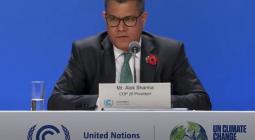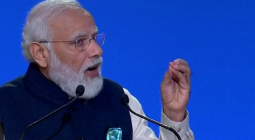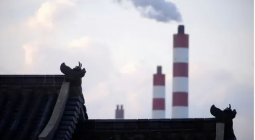COP26: Did India betray vulnerable nations?
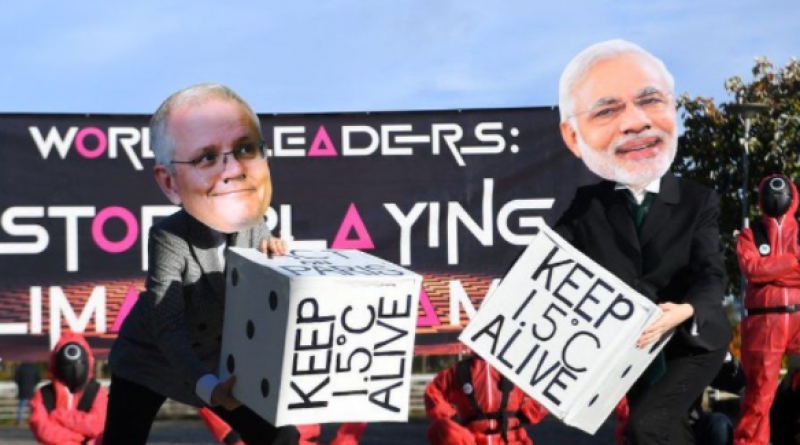
The Glasgow climate deal has put India and China in the spotlight after they opposed a commitment to "phase out" coal while negotiating the final agreement.
Instead, countries agreed to "phase down" coal, causing disappointment and concern over whether the world can limit the average global temperature rise to 1.5C.
"China and India will have to explain themselves and what they did to the most climate-vulnerable countries in the world," said the COP26 president, Alok Sharma. Mr Sharma also called the deal "historic" and said it "keeps 1.5C within reach".
Earlier drafts of the agreement contained an commitment to phase out unabated coal (unabated refers to coal that is burned without carbon capture and storage technology, which advocates say significantly decreases emissions).
So what happened?
At the start of the summit, Indian Prime Minister Narendra Modi pledged to cut emissions to net zero by 2070, reduce carbon emissions by one billion tonnes by 2030, and raise the share of renewables in the energy mix to 50%, among others.
The ambitious announcements, welcomed then, now stand in stark contrast to India's last-minute intervention to water down the language on coal.
China, which otherwise shares a tense relationship with its neighbour, was a strong ally throughout the final negotiations.
The summit was expected to end on Friday but went into overtime until a deal was hammered out late on Saturday night.
The last day of negotiations saw China argue "common but differentiated responsibilities and respective capabilities" or CBDR - it means countries that have signed the UN climate deal have a common responsibility to fight climate change, but have different capacities to do so given that they are in different stages of economic development.
China said that various countries' efforts to meet the 1.5C target should be seen in the context of their efforts to eradicate poverty.
India agreed. "How can anyone expect that developing countries make promises about phasing out coal and fossil fuel subsidies? Developing countries still have to do deal with their poverty reduction agenda," India's Environment Minister, Bhupender Yadav, said.
The words "phasing out unabated coal" had triggered the argument. Without a consensus, there would be no final text to adopt, and that meant the summit would fail.
So, key negotiators were seen huddling to secure an agreement ahead of the final session where the deal would be adopted.

At first, the cameras were focussed on Chinese negotiators, including their leader Xie Zhenhua, who were speaking to US special climate envoy, John Kerry. They were also seen speaking with Mr Sharma.
Then Mr Yadav was seen talking to Mr Sharma and the two spoke at least twice while everyone waited for the final session to begin.
When it did, India took the floor and sought permission to make a proposal. Mr Yadav proposed that the phrase "phase out unabated coal" in the final draft text of the agreement be replaced with "phase down coal".
His words were met with silence barring a few whistles in the background.
Once the agreement had been finalised, various countries took to the stage to express their disappointment over the change, arguing that "phasing out coal" was a major pillar to keep the 1.5C target alive.
"We do not need to phase down coal but to phase out coal," Switzerland said, while calling the process "untransparent".
"The longer you take to phase out coal, the more burden you put on natural environment and your economy," EU envoy Frans Timmermans said.
A heavy round of applause followed the statement.
Several small island states said keeping 1.5C out of reach would mean a death sentence for them.
Mr Sharma, seemingly on the brink of tears, apologised for the way things had unfolded.

But some experts say this could have been better handled by developed countries.
The emphasis on coal while leaving out oil and gas would disproportionately impact developing countries such as lndia and China, Brandon Wu, director of policy and campaigns at ActionAid, said.
"We would have liked the "phasing out" of all fossil fuels and not just coal," said Avinash Chanchal, senior climate campaigner, Greenpeace India.
He added that the "weakened draft reflected the lack of trust among rich and poor countries as previous commitments were not met".
Developing countries such as India have argued that they are being put under pressure to move from fossil fuels to renewables, while developed countries are not helping them financially and with technology.
"This text has so many lines on mitigation [emissions reduction]. What countries need to do, what they have to submit every year and even the details of upcoming high level meetings etc, but there is nothing on finance. How can we call this a balanced text?" Mr Yadav said.
India is the third-largest carbon emitter after China and the US but its per capita emissions is around seven times lower than that of the US, according to studies, including one by the World Bank.
An energy secure future is essential for India's economy - which is recovering from the pandemic while also battling sluggish growth - and coal is a big part of that goal.
"The challenge is to make it a just transition to low carbon so that people don't suffer," says Chirag Gajjar, an energy expert with World Resources Institute India.
"India's track record with renewables is solid; its target was 20 gigawatts by 2010 and by 2016 it was already heading towards 175 gigawatts. So, if India is able to send the right signal, renewables can grow exponentially."
If that happens, India will certainly win accolades but for now it has earned criticism for managing to water down what many say is a key commitment to fight global warming.
Mr Yadav, however, sees it differently.
"As COP26 draws to a close, I would like to thank the entire team with me in Glasgow that worked hard to make the summit a success for India," he has tweeted.
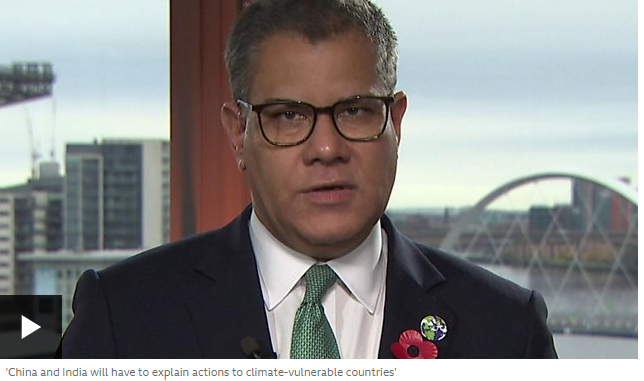
16 November 2021
BBC

